
Overview
A construction administration role is pivotal in overseeing the management and administration of construction projects. This position ensures that projects adhere to contractual obligations, timelines, and quality standards through effective communication and meticulous documentation.
Construction administrators are essential in coordinating tasks, managing finances, and mitigating risks, elements that are vital for the successful execution of building initiatives, especially in a rapidly evolving industry landscape.
By engaging with skilled construction administrators, organisations can navigate the complexities of project management with confidence, ultimately leading to enhanced project outcomes.
Introduction
In the realm of construction, effective administration serves as the backbone of successful project execution. As the industry navigates evolving challenges and increasing complexities, the role of construction administrators has become more critical than ever.
These professionals are responsible for overseeing a multitude of tasks that ensure projects adhere to timelines, budgets, and quality standards. Furthermore, they coordinate communication among diverse stakeholders and navigate regulatory frameworks, playing a pivotal role in fostering collaboration and mitigating risks.
As the demand for skilled professionals rises, understanding the significance of construction administration is essential for anyone aspiring to thrive in this dynamic field.
Defining Construction Administration
The construction administration role is pivotal in the management, oversight, and administration of development initiatives during both the predevelopment and building phases. This multifaceted discipline encompasses various activities aimed at ensuring projects fulfil contractual obligations, adhere to established timelines, and uphold high-quality standards. By facilitating effective communication among stakeholders, managing essential documentation, and proactively addressing potential issues, project administration is integral to the successful execution of initiatives.
The importance of project administration is underscored in today’s evolving market landscape. Recent studies reveal that effective building management practices can significantly mitigate risks, ensuring compliance with regulations and specifications.
Positions within building oversight encompass a broad spectrum of duties, including task coordination, financial oversight, and quality control. These roles are essential for maintaining momentum and ensuring alignment among all parties with the objectives. As the construction sector faces challenges such as declining home prices and a weakening job market, the demand for skilled professionals in construction administration becomes increasingly vital.
Current trends in construction administration jobs for 2025 indicate a shift towards more collaborative methods, emphasising risk oversight and stakeholder involvement. Naismiths exemplifies this through its comprehensive management services, which include contract administration, risk management strategies, and technical due diligence. The methodologies employed by Naismiths, such as detailed tracking and stakeholder communication protocols, ensure that all aspects of the project are managed effectively.
By providing thorough, clear reports and fostering open dialogue, building managers can navigate complex circumstances with professionalism and understanding, ultimately leading to successful completions.
In summary, the evolving landscape of management in the building sector underscores its crucial role in oversight. As the industry adapts to new challenges, the emphasis on effective administration practices will continue to grow, ensuring that tasks are executed efficiently and to the highest standards.
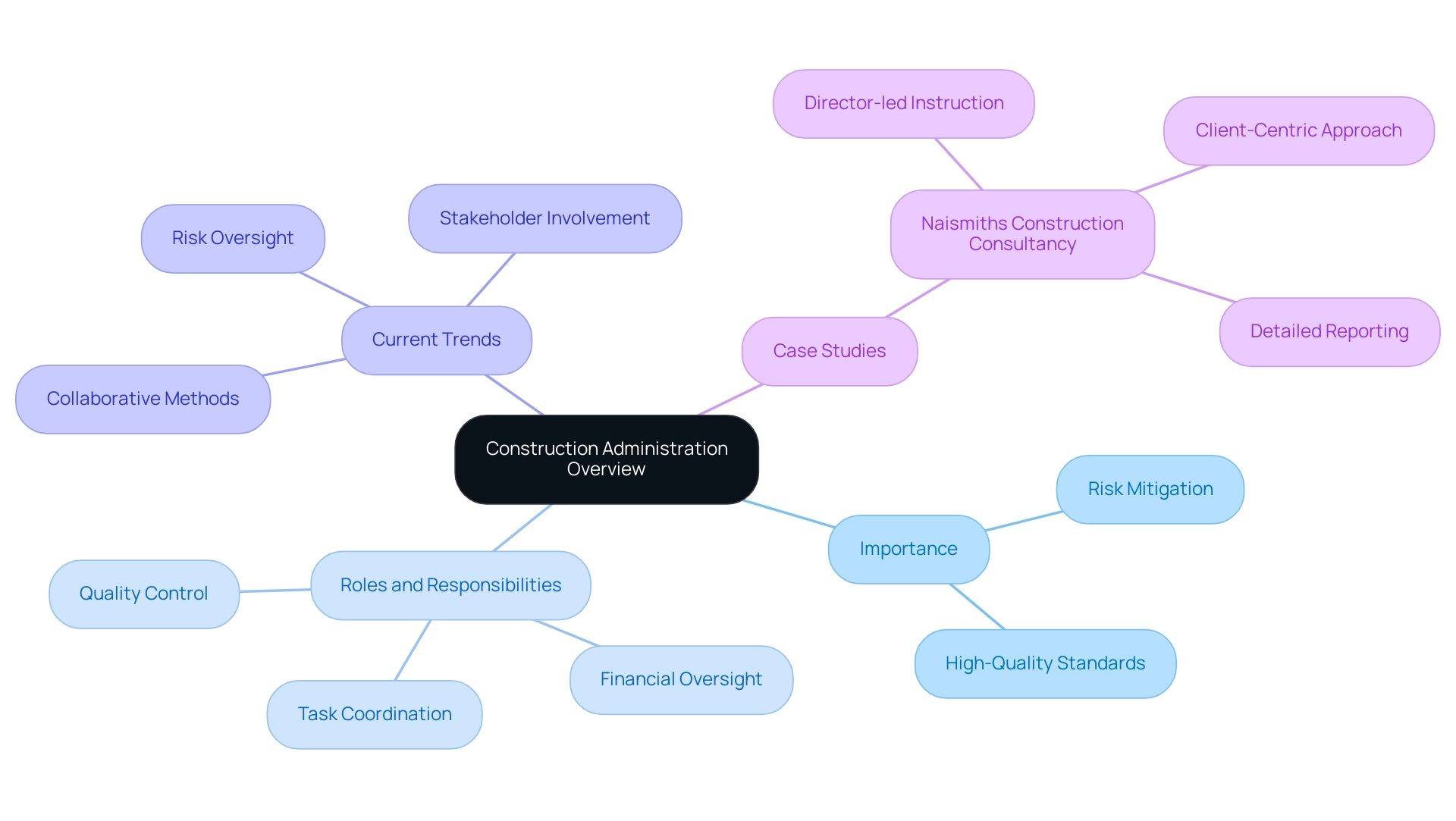
Key Responsibilities of a Construction Administrator
Building managers are pivotal in the development sector, overseeing a range of duties essential for success. Their responsibilities encompass monitoring contracts, maintaining schedules, and ensuring that all documentation is current and accurate. Acting as a crucial link among clients, contractors, and diverse stakeholders, building managers facilitate efficient communication and adeptly resolve disputes that may arise throughout the lifecycle.
Key responsibilities of a construction admin role for site administrators include:
- Reviewing submissions
- Tracking expenses
- Generating estimates
- Ensuring compliance with building codes and safety regulations
These tasks are vital for maintaining project integrity and adhering to budget constraints.
As the development landscape evolves, industry leaders underscore the growing significance of workflow optimisation. A recent FMI report indicates that 57% of building specialists believe this will be the most critical project oversight capability in the future. This shift underscores the necessity for project managers to possess advanced planning and resource management skills to mitigate costs and delays, rendering their role increasingly indispensable.
Real-world examples illustrate the impact of construction admin roles in managing contracts and schedules. For example, Naismiths Construction Consultancy, established in 1963, exemplifies how effective monitoring and advisory services can lead to successful outcomes. Their data-driven, commercially focused strategy for asset oversight ensures that initiatives are organised and regulated to the highest industry standards.
Naismiths’ oversight services are intricately linked to the duties of project managers, ensuring that projects remain on schedule and meet quality benchmarks, as evidenced by positive client feedback.
In 2025, the responsibilities of those in construction administration will continue to evolve, with an increasing focus on risk oversight and collaboration. Naismiths emphasises risk management and a collaborative spirit, ensuring that all parties achieve the best possible outcomes while maintaining high-quality standards throughout each project. Professionals must adapt to changing demands while upholding quality standards.
By adeptly managing the complexities of building projects, project managers fulfil a crucial role in construction administration, ensuring that all parties attain optimal results. Naismiths’ comprehensive property development platform, which includes risk evaluation, cost benchmarking, and real-time monitoring solutions, further supports project supervisors in their essential roles.
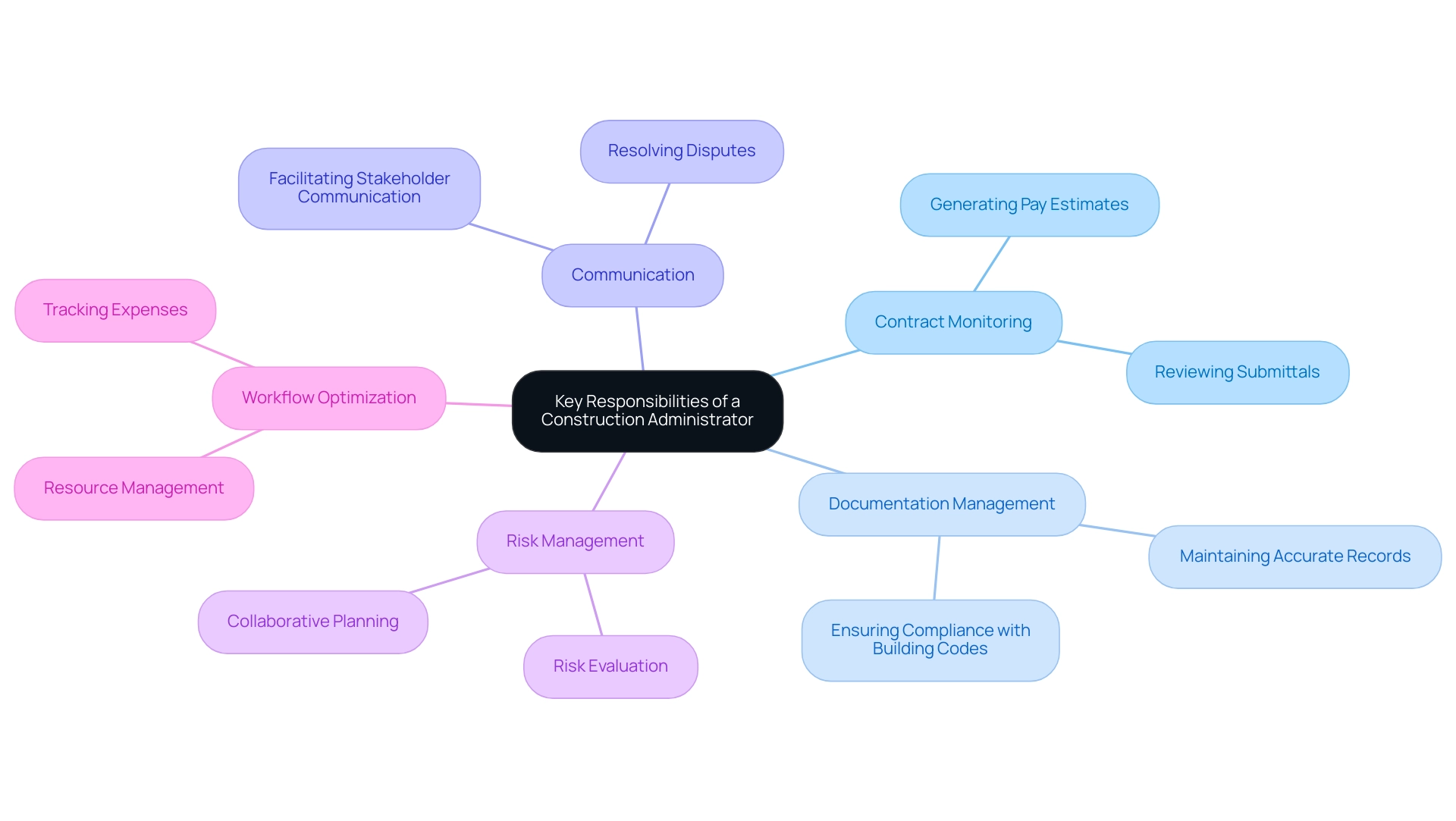
Essential Skills and Qualifications for Construction Administrators
To succeed as a building manager, individuals must exhibit outstanding organisational and communication abilities, along with a strong grasp of building procedures and regulatory structures. Expertise in software for overseeing tasks is essential, as is knowledge of budgeting and financial oversight practices. A bachelor’s degree in building supervision, engineering, surveying or a related field is typically required, alongside relevant work experience that demonstrates practical application of these skills.
Naismiths distinguishes itself in the market through its comprehensive property development platform, providing accurate cost data, performance assessment, and risk management solutions. The platform’s user-friendly interface enables individuals to enter and monitor essential data for property development initiatives, ensuring that managers have access to real-time information for informed decision-making. Naismiths’ dedication to director-led teaching and emphasising clients’ commercial concerns while managing delicate situations with professionalism enhances their role as a trustworthy ally in oversight and advisory services.
Essential abilities for a construction admin job in the building industry include problem-solving, negotiation, and conflict resolution, which are crucial for handling the complexities inherent in building initiatives. Statistics reveal that customer service, skills related to a construction admin job, documentation, and proficiency in Microsoft Excel collectively account for 34.49% of the skills found on resumes in this field, emphasising the importance of these competencies in meeting the industry’s needs.
Their knowledge not only aids in the seamless implementation of initiatives but also improves the overall efficiency of building oversight practices, ensuring that all parties attain optimal results. Building survey services in real estate consultancy evaluate all aspects of property ownership, including maintenance, defects, compliance, regulations, refurbishments, and reinstatement cost assessments on commercial, industrial, and residential development projects. Building consultancy is a service intended to provide expertise and guidance on construction projects and the efficient management of schemes. From the acquisition survey to preventative maintenance plans and reinstatement cost assessments, building consultants might be engaged at any phase of a development.
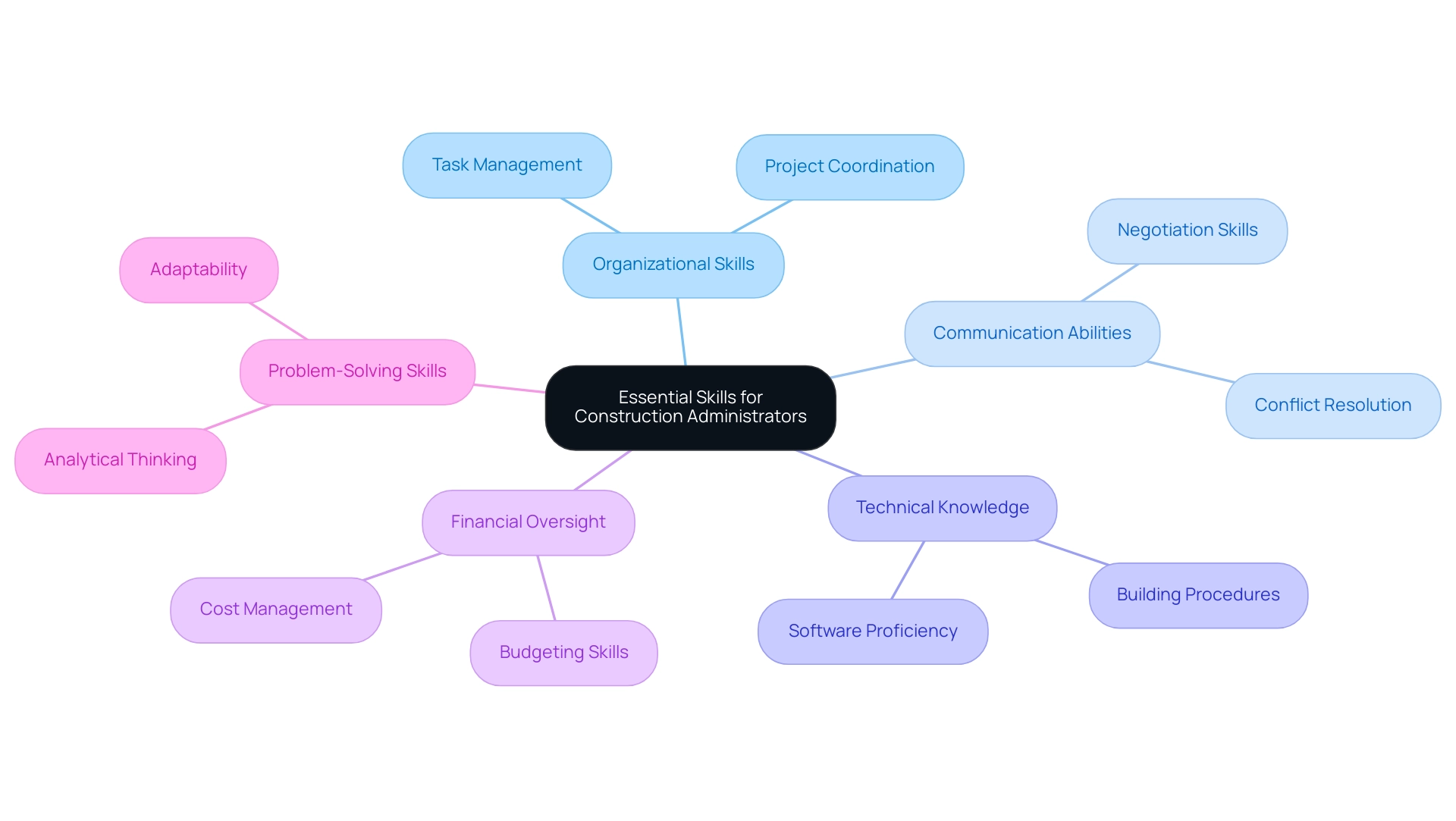
Educational Pathways and Training for Construction Administrators
Aspiring surveyors typically pursue a bachelor’s degree in project oversight, civil engineering, surveying or architecture. Numerous universities across the UK offer specialised programmes that focus on preparing students for careers in construction administration and project oversight, equipping them with the essential skills needed to thrive in this field. Notably, employment for surveyors is projected to grow by 9 percent between 2023 and 2033, underscoring the increasing demand for qualified professionals in this sector.
Moreover, a construction administration role in building management is regarded as a rewarding career path, with promising employment rates and high salaries anticipated for the future.
Acquiring certifications such as the Certified Construction Manager (CCM) or Project Management Professional (PMP) significantly enhances job prospects in construction administration and demonstrates a commitment to professional excellence. These credentials not only validate expertise but also provide a competitive edge in a crowded job market. In fact, a substantial percentage of building administrators hold certifications, highlighting their importance in career advancement.
Internships and entry-level positions within building companies are invaluable for gaining hands-on experience. Such opportunities enable individuals to cultivate practical skills and industry knowledge, essential for success in a construction administration role.
As noted by industry experts, a customer-centric approach in construction oversight emphasises risk control and collaboration, ensuring that all parties achieve optimal outcomes while maintaining high-quality standards throughout each project.
In 2025, educational pathways for building managers will continue to evolve, with an increasing number of institutions offering tailored programmes that address the specific demands of the sector. This trend reflects a growing recognition of the importance of formal education and certification in enhancing career prospects, particularly for those seeking a role in construction administration and effective supervision.
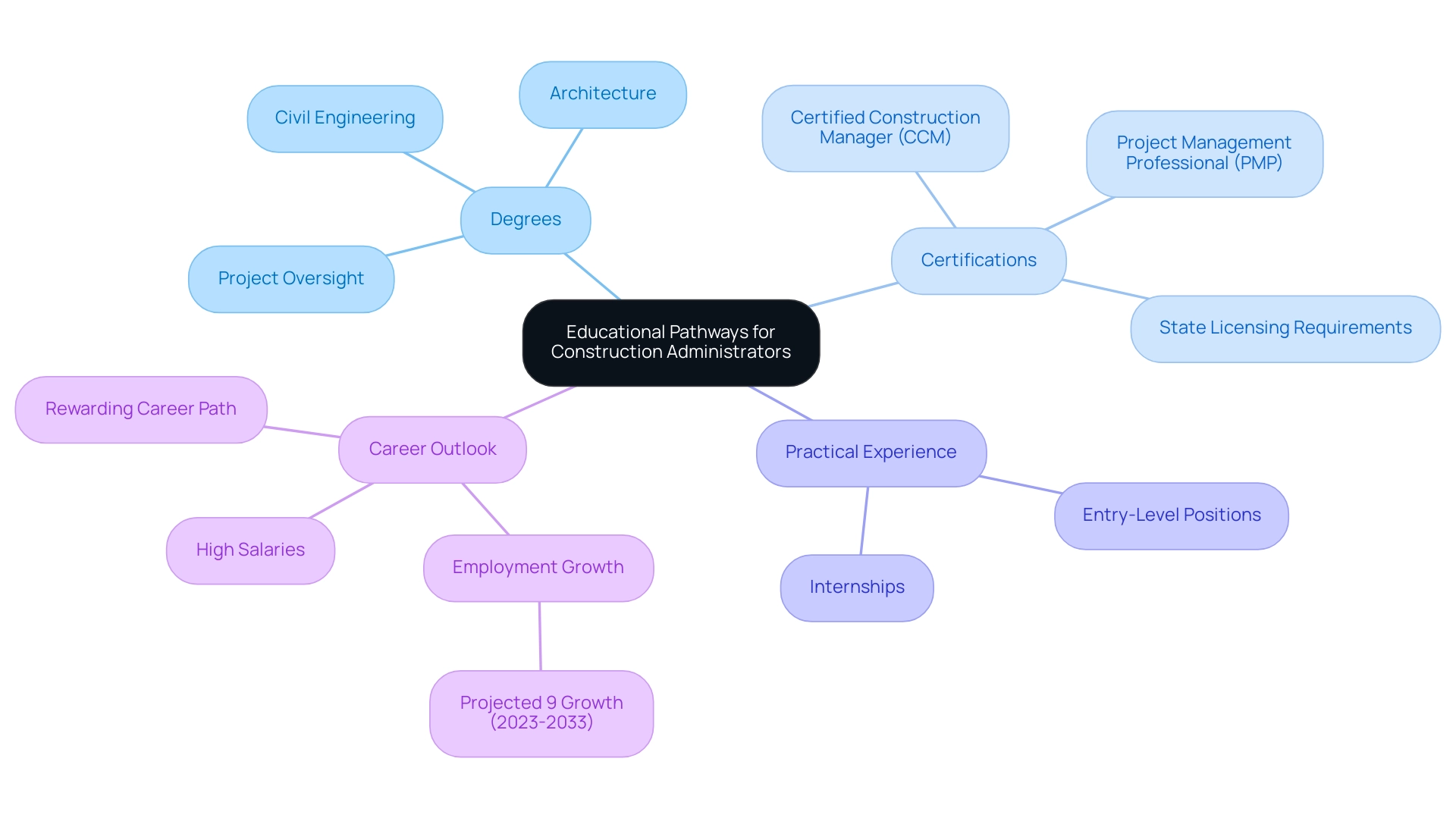
Work Environment: Where Construction Administrators Operate
In a construction administration role, professionals operate across diverse environments, including office settings, construction sites, and client locations. Their responsibilities are dynamic, often necessitating substantial on-site presence to monitor progress, conduct inspections, and facilitate effective communication among team members. This hands-on involvement is critical, enabling them to promptly address issues and ensure that tasks adhere to timelines and quality standards.
Project managers typically balance their time between on-site duties and office responsibilities. While specific time allocations may vary based on task requirements, many managers report spending approximately 60% of their time on-site and 40% in the office. This flexibility is essential, as they must adapt to rapidly changing circumstances and timelines within the construction sector.
Looking ahead to 2025, construction administrators will oversee daily operations on job sites, coordinate with subcontractors, and ensure compliance with safety regulations. They play a pivotal role in managing documentation and facilitating communication among various stakeholders, which is vital for maintaining project momentum.
Key competencies for managers in the construction industry encompass:
- Analytical skills
- Business skills
- Communication skills
- Decision-making skills
- Leadership skills
- Technical skills
These competencies are crucial for builders to excel in their varied positions.
However, the work environment for construction managers is not without challenges. Reports indicate that over half of construction workers, including administrators, are frequently exposed to harmful vapours, gases, dust, or fumes, with nearly three-quarters encountering noise levels that exceed recommended limits. Such conditions necessitate a strong emphasis on health and safety protocols to safeguard all personnel on-site.
Case studies illustrate how builders can distinguish themselves through their approach to task oversight.
In summary, the role of builders is multifaceted, necessitating a blend of technical skills, effective communication, and adaptability to thrive in both on-site and office environments.
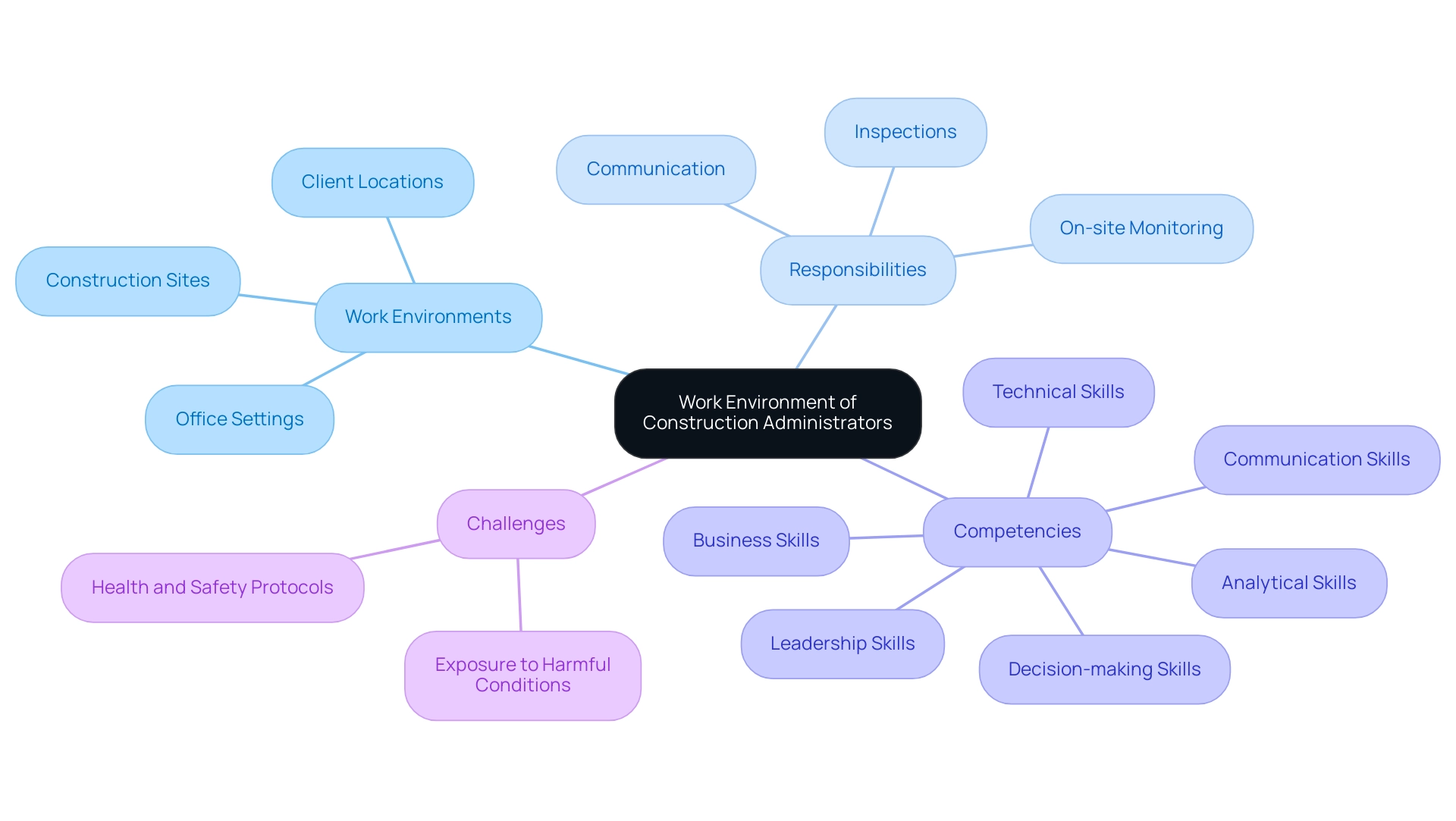
Career Outlook: Job Opportunities for Construction Administrators
The career prospects for builders aspiring to secure a construction admin job in management roles are exceptionally promising, with job openings anticipated to grow significantly as the building sector continues its upward trajectory. According to the statistics, employment for building managers, which encompasses project managers, is projected to increase by 9% from 2023 to 2033. This growth is primarily fuelled by a heightened demand for infrastructure development and the necessity for skilled professionals to oversee increasingly complex building projects.
As the sector progresses, building managers armed with specialised skills and certifications will find themselves well-positioned to seize emerging opportunities. The integration of advanced construction-related software and insurance offerings is also reshaping the landscape, creating new roles that require expertise in technology and coordination.
Moreover, the current demand for construction managers and administrators, particularly for the construction admin job, is underscored by the ongoing expansion across various sectors, including residential, commercial, and care home developments. This trend not only highlights the need for effective oversight but also underscores the importance of risk control and collaboration, key elements that Naismith embodies in its approach to monitoring and advisory services.
In terms of career progression, professionals in building management can expect a range of pathways, including construction admin roles, leadership positions, business advisory, and specialised consultancy. The ability to navigate sensitive situations with professionalism and empathy, as demonstrated by Naismiths, further enhances prospects for career advancement in this dynamic field. Naismiths’ dedication to prioritising clients’ commercial interests and fostering open communication, as highlighted in the case study on their market differentiation, positions them as a leader in the industry.
With the right expertise and a commitment to continuous learning, individuals in a construction admin job can achieve significant career milestones in the years ahead.
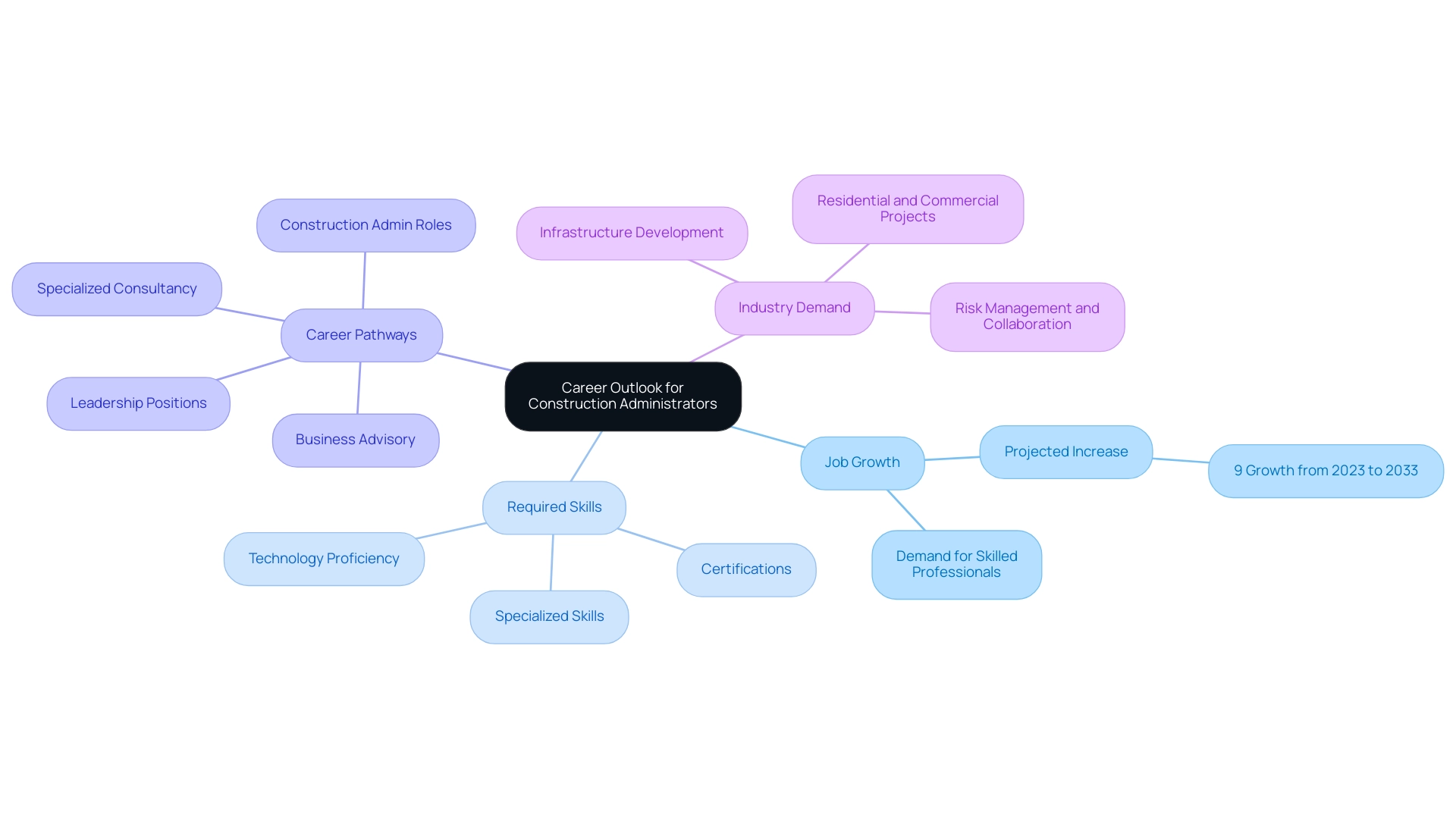
Collaboration in Construction: Working with Other Professionals
Construction managers play a crucial role in fostering collaboration among a diverse array of professionals, including architects, engineers, contractors, and managers. Their ability to facilitate effective communication is essential for aligning all elements with overarching goals and objectives. By cultivating a collaborative atmosphere, project managers not only help resolve conflicts but also enhance overall project efficiency and outcomes.
Research indicates that open office designs can boost collaboration by as much as 62%, underscoring the significance of workspace design in promoting teamwork. However, the actual increase in collaboration hinges on factors such as noise levels and the availability of facilities for focused work. This underscores the necessity for meticulous planning in both the physical and operational dimensions of development projects.
Statistics reveal that 75% of workers prefer to communicate with colleagues in a manner akin to conversations with friends, highlighting the need for authentic and honest communication within teams. Such an approach can markedly enhance collaboration among professionals in the building sector, leading to more effective conflict resolution and a stronger sense of unity.
In 2025, collaboration between administrators in the building industry and other professionals is more critical than ever, particularly as the field grapples with challenges related to inconsistent technology adoption. User-friendly technology, paired with comprehensive onboarding and ongoing training, is vital for successful implementation and collaboration. This ensures that all team members are equipped to work together effectively, ultimately driving success.
By prioritising collaboration and communication, professionals in construction administration can significantly influence the efficiency and quality of building endeavours, reinforcing their role as essential assets in the industry.
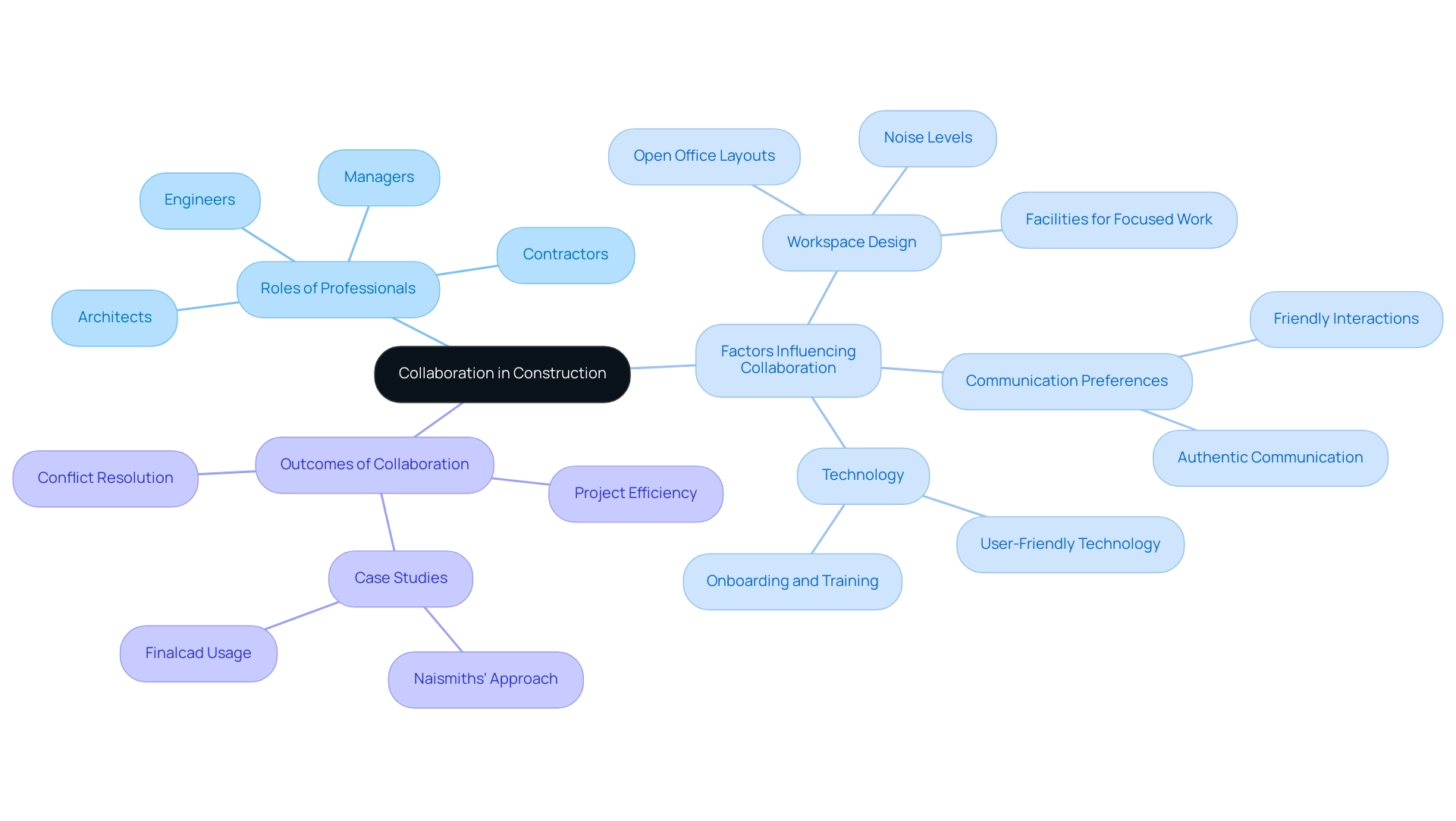
Challenges in Construction Administration: Navigating Complexities
Construction managers encounter a myriad of challenges that can significantly influence their success. Among these challenges are the pressures of tight deadlines, the intricacies of navigating complex regulations, and the necessity to address unforeseen issues that may arise during the course of a project. A recent survey indicates that 57% of building industry experts believe that workflow optimisation will be the most essential management skill in the future, underscoring the critical need for effective time management and problem-solving abilities in this role.
Furthermore, building managers must excel in conflict resolution among various stakeholders, ensuring that all parties remain aligned with the overarching objectives. This requires not only clear communication but also a proactive approach to planning for potential risks. By developing robust strategies to tackle these challenges, managers in the building sector can significantly enhance their effectiveness and contribute to successful outcomes.
This includes:
- Setting clear goals for the initiative
- Reviewing budgets
- Advising on procurement
- Ensuring compliance with statutory procedures
In addition, building surveyors play a crucial role in this process by assessing property ownership aspects, identifying potential issues, and ensuring compliance with regulations. Their expertise in evaluating building defects, health and safety hazards, and environmental risks is vital for maintaining integrity.
In summary, the ability to navigate the complexities of construction oversight is paramount for anyone in a construction administration role. By leveraging effective time management techniques and problem-solving strategies, they can overcome obstacles and drive projects toward successful completion.
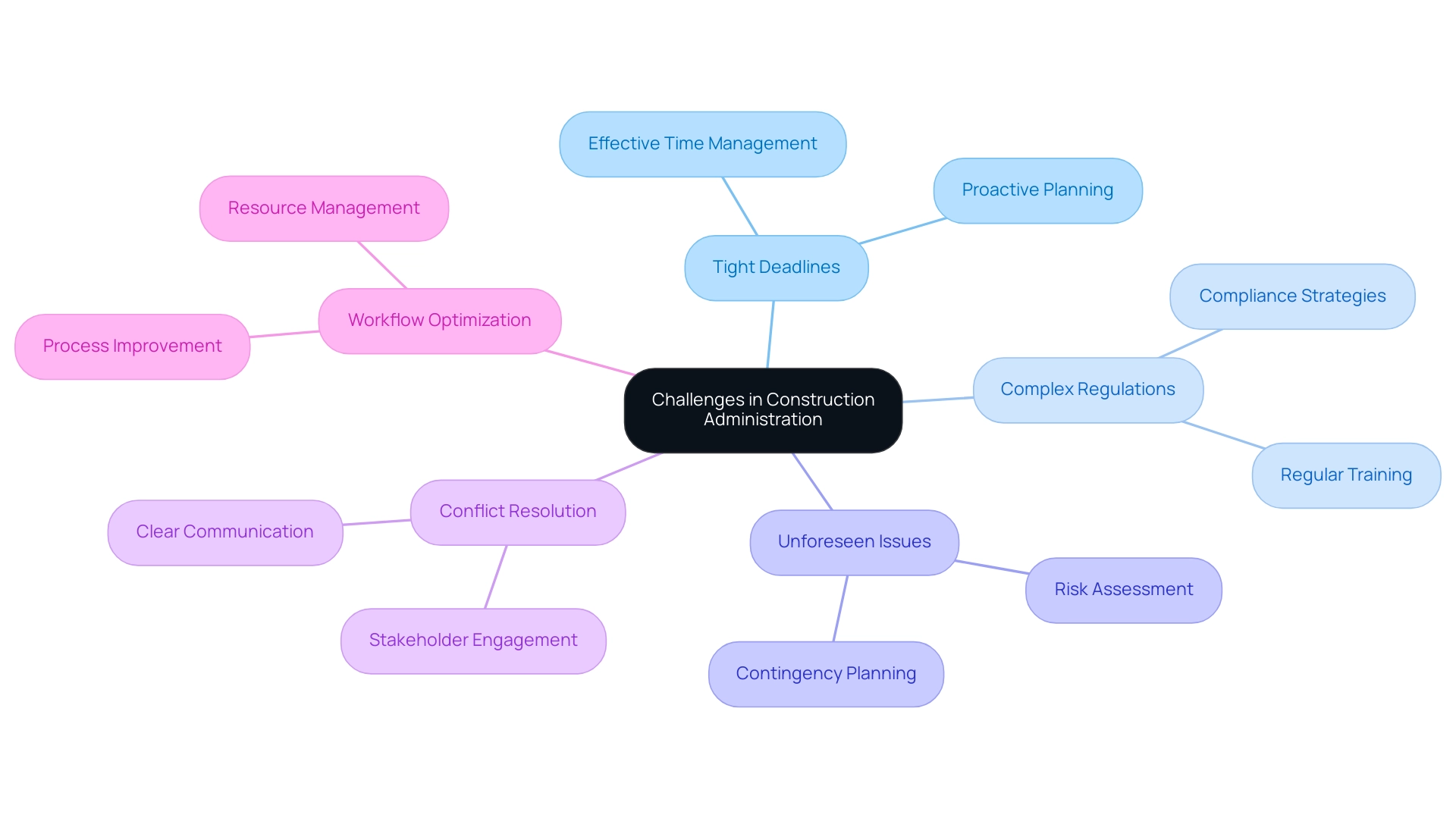
Conclusion
The significance of construction administration in the successful execution of projects cannot be overstated. As the industry continues to evolve, the role of construction administrators becomes increasingly pivotal in managing complex tasks that ensure adherence to timelines, budgets, and quality standards. Their responsibilities span a wide range, from monitoring contracts and managing documentation to facilitating communication among diverse stakeholders, which is essential for effective project coordination.
Furthermore, the demand for skilled construction administrators is projected to grow, driven by the ongoing need for infrastructure development and the complexities of modern construction projects. With a focus on collaboration, risk management, and leveraging advanced technologies, construction administrators are well-positioned to address the challenges that lie ahead. The integration of user-friendly project management tools and a proactive approach to conflict resolution will enhance their ability to navigate the intricate landscape of construction.
As educational pathways and certifications continue to evolve, aspiring construction administrators will need to equip themselves with the necessary skills and knowledge to thrive in this dynamic field. Embracing a customer-centric approach, as exemplified by firms like Naismiths, will further reinforce the importance of effective communication and collaboration among all project stakeholders.
In conclusion, the future of construction administration looks promising, with ample opportunities for growth and advancement. By prioritising continuous learning and adapting to industry changes, construction administrators can ensure not only their own success but also the successful completion of high-quality projects that meet the needs of communities and clients alike. The role is transformative, making construction administrators indispensable assets in the ever-evolving construction landscape.